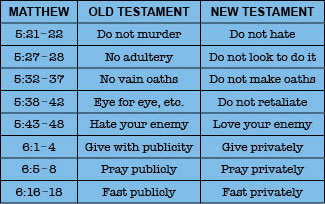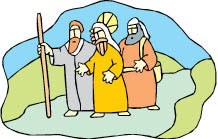

 just
by hitting it or speaking to it. I found that 96 of the 100
objections came from the Old Testament. Of the four from the New
Testament, one wanted to know what Jesus and God were doing between
Malachi and Matthew and had an obscene proposal. The other three
were the usual challenges to the virgin birth, the resurrection, and
the miracles of Jesus.
just
by hitting it or speaking to it. I found that 96 of the 100
objections came from the Old Testament. Of the four from the New
Testament, one wanted to know what Jesus and God were doing between
Malachi and Matthew and had an obscene proposal. The other three
were the usual challenges to the virgin birth, the resurrection, and
the miracles of Jesus. In the world of the Old Testament,
none of these things were possible. An additional complication in
the Old Testament was that even though God told man and woman to
become one flesh and that there would be a special relationship
between them, man did not follow that admonition (see Genesis 2:24). Polygamy and the use
of concubines was never commanded by God just as slavery was never
commanded by God. It was Sarai who chose to have Abram take Hagar as
a concubine producing a tragic story of conflict and pain for all
involved (Genesis 16). Humans chose to
introduce these destructive practices as fixes to perceived needs.
People resolved debt by selling themselves into slavery (Leviticus 25:39 – 41; Deuteronomy 15:12). When a
woman was widowed and had no method of support, the responsibility
fell on the brother of her husband (Deuteronomy 25:5 –10). In this
barbaric and primitive world women became pawns that could be sold
or traded. The Law of Moses addressed all of this, but man’s
selfishness produced some horrible results. This is precisely why
Jesus came saying in essence, “This is what you have been taught in
the past, but I am saying to you here is a better way” (Matthew 5 – 7).
In the world of the Old Testament,
none of these things were possible. An additional complication in
the Old Testament was that even though God told man and woman to
become one flesh and that there would be a special relationship
between them, man did not follow that admonition (see Genesis 2:24). Polygamy and the use
of concubines was never commanded by God just as slavery was never
commanded by God. It was Sarai who chose to have Abram take Hagar as
a concubine producing a tragic story of conflict and pain for all
involved (Genesis 16). Humans chose to
introduce these destructive practices as fixes to perceived needs.
People resolved debt by selling themselves into slavery (Leviticus 25:39 – 41; Deuteronomy 15:12). When a
woman was widowed and had no method of support, the responsibility
fell on the brother of her husband (Deuteronomy 25:5 –10). In this
barbaric and primitive world women became pawns that could be sold
or traded. The Law of Moses addressed all of this, but man’s
selfishness produced some horrible results. This is precisely why
Jesus came saying in essence, “This is what you have been taught in
the past, but I am saying to you here is a better way” (Matthew 5 – 7). In Galatians 3:24 the Old Testament
is referred to as a “schoolmaster to bring us to Christ, that we
might be justified by faith. But after faith has come, we are no
longer under a schoolmaster.” There are many lessons that can be
learned from Old Testament stories, but much of the violence and war
that the Bible records are not violence or wars that God commanded.
They are the actions of humans functioning on their own, without
God’s instructions. Jephthah’s vow to sacrifice his daughter in Judges 11:30 – 40 was not
something God commanded be done. The lesson of not making careless
vows is there, but what happened was history, not a theological
example of what we should do. The horrible story in Judges 19 of a woman who was
unfaithful to her husband and later was gang raped to death by the
men of Gibeah causing her husband to cut her body up and send pieces
all over Israel is history — not a command of God. The attitude of
many biblical skeptics would make the local newspaper responsible
for causing all of the bad news they report.
In Galatians 3:24 the Old Testament
is referred to as a “schoolmaster to bring us to Christ, that we
might be justified by faith. But after faith has come, we are no
longer under a schoolmaster.” There are many lessons that can be
learned from Old Testament stories, but much of the violence and war
that the Bible records are not violence or wars that God commanded.
They are the actions of humans functioning on their own, without
God’s instructions. Jephthah’s vow to sacrifice his daughter in Judges 11:30 – 40 was not
something God commanded be done. The lesson of not making careless
vows is there, but what happened was history, not a theological
example of what we should do. The horrible story in Judges 19 of a woman who was
unfaithful to her husband and later was gang raped to death by the
men of Gibeah causing her husband to cut her body up and send pieces
all over Israel is history — not a command of God. The attitude of
many biblical skeptics would make the local newspaper responsible
for causing all of the bad news they report. The main point that needs to be made
here is that if something is stated as a miracle, then it is not
going to be scientifically explainable. The thing that makes it a
miracle is that it is not possible by normal processes on the earth.
If it were explainable then it would not be a miracle. There are
relatively few miracles in the Bible. People tend to focus on the
miracles, but of the thousands of events described in the Bible very
few are stated to be miracles. Those that are can be seen to be
scientifically impossible. A good example of this is the story of
“Jonah and the Whale.” I put that as a title and in quotes because
the Bible does not say it was a whale. The Hebrew word used in the
book of Jonah is dag, which means fish. Skeptics will be quick to
point out that no human could live for three days inside any fish or
sea mammal known and probably not any animal of the past. The Bible
states clearly however, that the creature that swallowed Jonah was a
special creation of God (Jonah 1:17).
It was not a natural occurrence and would not have a scientific
explanation.
The main point that needs to be made
here is that if something is stated as a miracle, then it is not
going to be scientifically explainable. The thing that makes it a
miracle is that it is not possible by normal processes on the earth.
If it were explainable then it would not be a miracle. There are
relatively few miracles in the Bible. People tend to focus on the
miracles, but of the thousands of events described in the Bible very
few are stated to be miracles. Those that are can be seen to be
scientifically impossible. A good example of this is the story of
“Jonah and the Whale.” I put that as a title and in quotes because
the Bible does not say it was a whale. The Hebrew word used in the
book of Jonah is dag, which means fish. Skeptics will be quick to
point out that no human could live for three days inside any fish or
sea mammal known and probably not any animal of the past. The Bible
states clearly however, that the creature that swallowed Jonah was a
special creation of God (Jonah 1:17).
It was not a natural occurrence and would not have a scientific
explanation. When my wife Phyllis and I wrote our
wills, we had a certain set of circumstances in our family that
required certain provisions to be made. Our son with multiple
handicaps had certain needs that had to be taken into account if we
were not going to be there to do it. Our daughters needed provision
to be able to secure their college education if their parents were
no longer on the scene. By May of 2008 there had been a lot of
changes in our lives. Both of our girls had graduated from college
and had successful careers and families. Our son was in an
assisted-living facility and under the direction of a corporation
that takes care of disabled adults. My wife died. It was time to
write another will because the situations the old will was designed
to serve were no longer relevant. When I re-did my will my new will
abrogated my old will.
When my wife Phyllis and I wrote our
wills, we had a certain set of circumstances in our family that
required certain provisions to be made. Our son with multiple
handicaps had certain needs that had to be taken into account if we
were not going to be there to do it. Our daughters needed provision
to be able to secure their college education if their parents were
no longer on the scene. By May of 2008 there had been a lot of
changes in our lives. Both of our girls had graduated from college
and had successful careers and families. Our son was in an
assisted-living facility and under the direction of a corporation
that takes care of disabled adults. My wife died. It was time to
write another will because the situations the old will was designed
to serve were no longer relevant. When I re-did my will my new will
abrogated my old will. Jesus and the New Testament writers
clearly indicated the elimination of the old will of God and the
establishment of the new. In Colossians
2:9 –18 and 3:10 –11
Paul makes it clear. In 2:14
we are told that Jesus blotted “out the handwriting of ordinances
that was against us, which was contrary to us, and took it out of
the way, nailing it to his cross.” In Galatians 3:24 – 29 the Old
Testament is portrayed as a schoolmaster, but it says “we are no
longer under a schoolmaster.” In Ephesians
2:10 – 22 this message is repeated. All of these passages talk
about the universal equality of all human beings who are one in
Christ. In Hebrews 10:12 – 20
the covenants are discussed and the new covenant is called “a new
and living way, which he hath consecrated for us” (verse 20). In Matthew 27:51 when the veil of the
temple is ripped from top to bottom at the death of Christ, the new
will of God was enacted and the separation of men based on racial,
cultural, or ethnic differences was done away with.
Jesus and the New Testament writers
clearly indicated the elimination of the old will of God and the
establishment of the new. In Colossians
2:9 –18 and 3:10 –11
Paul makes it clear. In 2:14
we are told that Jesus blotted “out the handwriting of ordinances
that was against us, which was contrary to us, and took it out of
the way, nailing it to his cross.” In Galatians 3:24 – 29 the Old
Testament is portrayed as a schoolmaster, but it says “we are no
longer under a schoolmaster.” In Ephesians
2:10 – 22 this message is repeated. All of these passages talk
about the universal equality of all human beings who are one in
Christ. In Hebrews 10:12 – 20
the covenants are discussed and the new covenant is called “a new
and living way, which he hath consecrated for us” (verse 20). In Matthew 27:51 when the veil of the
temple is ripped from top to bottom at the death of Christ, the new
will of God was enacted and the separation of men based on racial,
cultural, or ethnic differences was done away with. Another device used by atheists to
discredit Christianity is to point to the church as illogical and
inconsistent with common sense. Why does God need our money, our
prayers, our praise, our requests, and our service? The answer to
this question is that he does not! God is not a human who has human
needs that must be met by human actions. We do not praise God
because he has a self-image problem, or pray to him because he needs
our information. Giving is not done because God needs our financial
support. The church is the people who are “called out.” The called
out are given tools that help them do what God has called them to
do, which in turn brings satisfaction, joy, peace, and stability in
a confused world.
Another device used by atheists to
discredit Christianity is to point to the church as illogical and
inconsistent with common sense. Why does God need our money, our
prayers, our praise, our requests, and our service? The answer to
this question is that he does not! God is not a human who has human
needs that must be met by human actions. We do not praise God
because he has a self-image problem, or pray to him because he needs
our information. Giving is not done because God needs our financial
support. The church is the people who are “called out.” The called
out are given tools that help them do what God has called them to
do, which in turn brings satisfaction, joy, peace, and stability in
a confused world. We gather together in
worship to facilitate our looking to a higher power, and being
encouraged and uplifted by our time with people of like faith. The
church enables us to manage our benevolent work and increase our
service to our fellow human beings. Atheists can complain about the
church all they want, but the fact is that the church meets the
needs that are present all through out the world. From homeless
shelters, to food kitchens and pantries, to caring for the elderly
and orphans it is primarily churches that do the work — not atheist
organizations. The church facilitates education and encourages
morality, and while there are weak people in churches just as there
are everywhere in life, it is still the church that teaches and
provides means for people to
We gather together in
worship to facilitate our looking to a higher power, and being
encouraged and uplifted by our time with people of like faith. The
church enables us to manage our benevolent work and increase our
service to our fellow human beings. Atheists can complain about the
church all they want, but the fact is that the church meets the
needs that are present all through out the world. From homeless
shelters, to food kitchens and pantries, to caring for the elderly
and orphans it is primarily churches that do the work — not atheist
organizations. The church facilitates education and encourages
morality, and while there are weak people in churches just as there
are everywhere in life, it is still the church that teaches and
provides means for people to  live moral and
responsible lives. Church is not a political organization, nor is it
nationalistic or racial. You cannot read passages like Galatians
3:28 and not see the radical teachings of equality of all humans in
the New Testament.
live moral and
responsible lives. Church is not a political organization, nor is it
nationalistic or racial. You cannot read passages like Galatians
3:28 and not see the radical teachings of equality of all humans in
the New Testament. thoroughly
furnished unto all good works” (2 Timothy 3:16 –17).
thoroughly
furnished unto all good works” (2 Timothy 3:16 –17).Back to Contents Does God Exist?, JanFeb12.